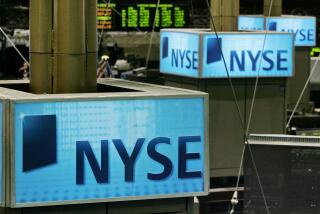Moving On After Financial Scandals
- Share via
Quick -- name the most recent big corporate accounting scandal.
If only WorldCom Inc. comes to mind, that’s a good answer. And note the date: WorldCom’s revelation that it would have to restate $3.9 billion of expenses came in late June.
Since then, the telecom giant has raised its restatement tally to more than $9 billion. But the rumors that racked the stock market in July -- that many more WorldComs or mini-WorldComs were in the wings -- didn’t pan out.
Federal Reserve Chairman Alan Greenspan, testifying before a congressional committee July 17, predicted that there would be “significant restatements” of corporate earnings ahead of the Aug. 14 deadline for chief executives of the largest U.S. companies to certify their firms’ financial statements.
But the deadline came and went, the vast majority of CEOs certified as required, and the expected restatement wave never materialized.
To Robert Olstein, a Purchase, N.Y.-based money manager who has gained renown for paying close attention to corporate balance sheets and income statements for 30 years, accounting scandals are “yesterday’s story,” as he puts it.
It was a big story, to be sure -- and the search for the guilty could go on for a long time. The Securities and Exchange Commission continues to pursue bookkeeping investigations at many companies that will keep the agency’s lawyers, and those of corporate defendants, busy for years. New probes are certain to be opened.
And the national accounting oversight board created by Congress in summer and now struggling to launch itself while it awaits a new chairman (after the first one, William H. Webster, resigned under fire) may next year have new ideas about what’s legitimate financial reporting and what isn’t.
But Olstein, whose Olstein & Associates manages $1.3 billion, believes investors are missing the boat if they’re too frightened or disgusted to research and buy stocks because of fears that corporate books have universally been cooked.
“Let’s move on,” Olstein said. Major accounting scandals have occurred repeatedly in American history, he said. Something else also has occurred repeatedly, he notes: Corporate profitability -- genuine profitability -- has rebounded after recessions, making many stocks more attractive investments.
The message may seem flip in a year when trillions of dollars in equity market value has been wiped out at least in part because of corporate chicanery. But Olstein’s point is that investors should spend more of their time looking ahead now, not behind.
His hard-nosed focus on balance sheets and income statements, hunting for companies whose true earnings power doesn’t appear to be reflected in their share prices, has delivered an average annual return of 3.4% to shareholders of his Olstein Financial Alert fund over the last three years, during the worst bear market in a generation.
By contrast, the average U.S. stock mutual fund has lost 8.2% a year in the same period, according to Morningstar Inc.
Now Olstein is looking for a recovery in corporate earnings in 2003 to lift the stock market as well. He views the market overall as “fairly valued” today, which leaves room for stocks to advance if underlying earnings do too, he said.
Wall Street analysts, disgraced though their profession may be in the eyes of many investors, still are useful as a point of reference for corporate earnings expectations. According to estimates-tracker Thomson First Call, analysts predict that operating earnings for the Standard & Poor’s 500 companies will rise about 2% this year, beginning to revive from last year’s plunge.
In 2003, analysts expect S&P; 500 earnings to jump 14.6%.
Putting aside the perennial issue of whether analysts are too optimistic, many investors may view the key question as whether any earnings rebound reported by companies can be trusted. How do we know the numbers are real, given the accounting tricks that seemingly were widespread in the late 1990s?
Skeptics can argue that the only reason a massive earnings restatement wave didn’t precede CEOs’ financial-certification deadline in August is that most CEOs are hoping they won’t get caught -- in other words, that an overburdened SEC won’t be able to identify everyone who played fast and loose with accounting during the boom years.
The SEC still is very much in the hunt. Copper producer Phelps Dodge Corp. last week disclosed that the SEC is examining the company’s accounting for mining properties where Phelps had cut production. The probe could result in new write-offs against previously reported results, the company said. Its stock fell 9% for the week.
Still, investors shouldn’t discount that there are very good reasons that true earnings can bounce sharply after recessions, Olstein said.
For one, corporate cost-cutting usually is fierce during and after recessions. It’s still going on at many companies, both in terms of staff cuts and reductions in capital spending and other expenses.
A Business Roundtable survey of 150 CEOs of major companies, reported last week, showed that 60% expect to cut jobs in 2003 -- even though an even higher percentage expect that their companies’ sales will rise.
Higher sales with lower costs set the table for more money to fall directly to the bottom line -- the essence of earnings leverage.
With their cost-cutting, many companies have taken what Olstein calls “kitchen-sink write-offs” over the last two years, as excess and inefficient production capacity has been closed or sold.
Investors may tire of such supposedly “one-time” write-offs occurring repeatedly, but for companies that have legitimately worked to become more efficient, those write-offs should be near an end and won’t be dirtying-up income statements in 2003, Olstein said.
Likewise, companies that have cut capacity should face lower depreciation expenses, which also can boost the bottom line (though depreciation, as Olstein notes, is a non-cash charge in any case).
Olstein still has one big concern about 2003 earnings: the potential hit some companies will take because they are using unrealistic assumptions about what their employee pension funds will earn. If those targets aren’t reached, firms may have to ante-up more pension cash.
Nonetheless, Olstein is optimistic that what he has long termed the “quality of earnings” will improve next year. And with it, he said, will come the potential for higher stock prices.
“The quality of earnings always goes up at the end of bear markets,” he said. There’s no reason to believe that this time will be different, he said.
For investors who believe that earnings will continue to rebound in 2003, and that they’ll be real enough, the issue is how to value them -- that is, how high a share price to pay for $1 of reported earnings per share.
Ed Keon, an investment strategist at Prudential Securities in New York, makes the case that the true earnings that will be generated by S&P; 500 companies this year will be equal to what they generated in 1997, though down sharply from the results reported in the boom years of 1999 and 2000.
If earnings are back to 1997 levels, where are share prices? The S&P; 500 index, at 909.83 on Friday, is 6% below its 970.43 closing level at the end of 1997.
Meanwhile, Keon notes, interest rates are far below their levels of 1997, and inflation also is lower.
If the world as we know it doesn’t end, and even allowing for slower earnings growth in the next few years than during the boom years, if stocks are judged against interest rates and inflation they are “very cheap,” Keon contends.
*
Tom Petruno can be reached at tom.petruno@latimes.com. For recent columns on the Web go to: www.latimes.com/petruno.
More to Read
Inside the business of entertainment
The Wide Shot brings you news, analysis and insights on everything from streaming wars to production — and what it all means for the future.
You may occasionally receive promotional content from the Los Angeles Times.










